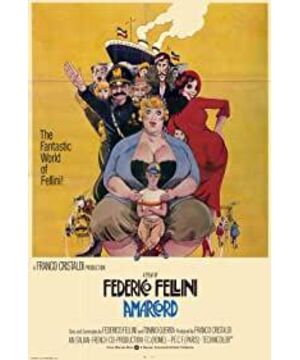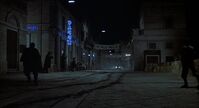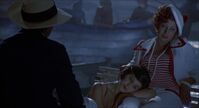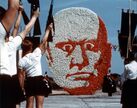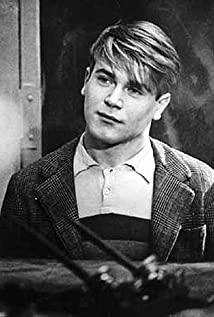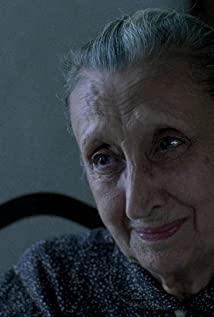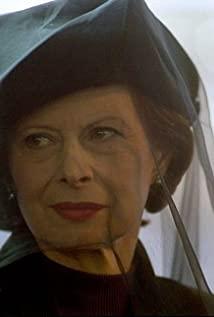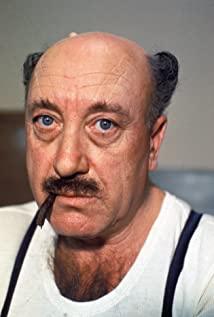I don't know if anyone has the same opinion as me, and there is a familiar nostalgia in Rilke's pen: "I have a feeling that all the time seems to disappear from this room, and we are like a group of characters in a picture. But Time then hurried back and overtook us with a soft, silky voice, and there was no end to it." This autobiographical film actually documents the most important turning point in Fellini's life. For Fellini, who has excellent vision in his soul, the hometown in life and memory is not an idyllic life, it has a rich emotional source. The serious and witty atmosphere of this town, the turbulent youth, the rambunctious father, the funny teachers and classmates, the socially frequented villagers... Even a white cow walking towards the young man in the depths of the fog, even if he came He disappeared without a trace, which still caused him to bend his knees in shock to prepare for defense, but he could only stand still, unable to move for a long time. All these compositions of desire-driven Neverland planted the seeds of creation early in Fellini's heart. The sliced incoherent treatment doesn't disturb the viewing either, and Fellini's fragmentation tends toward a kind of integrity as soon as you cast a cursory glance at the fluffy grass throughout. The fluffy fluffy grass fluttering in the sky attempts to get rid of the conventional use, reminding the audience that "I" has completed a growth transformation during this period. Because one day, the mother can rest in peace forever, and the reverie courtesan lover also docks and stops. "I" lost its original interest and seemed to start living with a new, never-before-used experience. In fact, when the cigarette girl approached "me" with her full breasts bare, I've found myself isolated in the predicament of doubting and oppressing the once dizzyingly close breasts, a feeling deepened by "me" sucking hard and clumsily. "Don't blow, suck", "You have to suck, fool!"..."I" felt my cheeks get hot, my ears red, my throat twitched, the skin on my forehead tightened, and I couldn't stop sweating... cigarette seller The girl became impatient, and the poor "I" did not receive her comfort and sympathy, but the master who inspired the desire mercilessly gathered up the deadly weapon of seduction, put on a face of disgust, and brutally interrupted all this. Presumably, the effect of this pair of big breasts tonight is only to weaken the sexual fantasy of "I", and from this night onwards, the teenager often has the fear of being powerless when overwhelmed by "giant". Fellini also feared centralization and autocracy, but he did not act as a judge to judge the sins of fascism, but, as always, stared at the small details of life affected by it, magnified and presented them. He photographed the various reactions of the people in the town to the German army, including an anti-fascist father, a fascist-influenced teenager, a courtesan who adored the German army... We can't see the shadow of fascism over the Italians' heads. I can't understand how profound the criticism is. Even the father, who was forced to drink a bottle of castor oil, did not cause the audience to sob, as he was mocked by his son when he returned home. In an instant, the heavy feeling disappeared, and the negative emotions were dissolved into playful banter here. Perhaps, this way of expression can better reflect what Fellini really fears is exactly what he avoids! Fellini is keen to demonstrate self-awareness while deliberately maintaining a distance between "I" and the narrative, allowing an outsider wandering the alleys of the village to act as his avatar. Kind of like Woody Allen's "Love in Rome", where the architect John plays the role, his presence is so free, anytime, anywhere; he rambles as he walks, but it's not annoying, he tells the story he knows , precisely those places that are particularly likely to arouse the interest of the audience. At the end of the film, the picture is like the color matching of film. As the fog thickens and gradually fades away, countless soft grasses are circling, creating a vibrant spring scene, as if finishing a memory arrangement. . Rilke's poem: "We: always, everywhere, as a bystander/to all things, and never get rid of it!" When one looks at all the portraits as a bystander, and leaves, a The "miniature world of memories, feelings, experiences, perceptions and fears" remained there. The various reactions of the people to the German army, including an anti-fascist father, a fascist-influenced teenager, a courtesan who fervently admired the German army... We can't see the shadow of fascism over the Italians' heads, and we can't understand how much profound criticism. Even the father, who was forced to drink a bottle of castor oil, did not cause the audience to sob, as he was mocked by his son when he returned home. In an instant, the heavy feeling disappeared, and the negative emotions were dissolved into playful banter here. Perhaps, this way of expression can better reflect what Fellini really fears is exactly what he avoids! Fellini is keen to demonstrate self-awareness while deliberately maintaining a distance between "I" and the narrative, allowing an outsider wandering the alleys of the village to act as his avatar. Kind of like Woody Allen's "Love in Rome", where the architect John plays the role, his presence is so free, anytime, anywhere; he rambles as he walks, but it's not annoying, he tells the story he knows , precisely those places that are particularly likely to arouse the interest of the audience. At the end of the film, the picture is like the color matching of film. As the fog thickens and gradually fades away, countless soft grasses are circling, creating a vibrant spring scene, as if finishing a memory arrangement. . Rilke's poem: "We: always, everywhere, as a bystander/to all things, and never get rid of it!" When one looks at all the portraits as a bystander, and leaves, a The "miniature world of memories, feelings, experiences, perceptions and fears" remained there. The various reactions of the people to the German army, including an anti-fascist father, a fascist-influenced teenager, a courtesan who fervently adore the German army... We can't see the shadow of fascism over the Italians' heads, and we can't interpret how much profound criticism. Even the father, who was forced to drink a bottle of castor oil, did not cause the audience to sob, as he was mocked by his son when he returned home. In an instant, the heavy feeling disappeared, and the negative emotions were dissolved into playful banter here. Perhaps, this way of expression can better reflect what Fellini really fears is exactly what he avoids! Fellini is keen to demonstrate self-awareness while deliberately maintaining a distance between "I" and the narrative, allowing an outsider wandering the alleys of the village to act as his avatar. Kind of like Woody Allen's "Love in Rome", where the architect John plays the role, his presence is so free, anytime, anywhere; he rambles as he walks, but it's not annoying, he tells the story he knows , precisely those places that are particularly likely to arouse the interest of the audience. At the end of the film, the picture is like the color matching of film. As the fog thickens and gradually fades away, countless soft grasses are circling, creating a vibrant spring scene, as if finishing a memory arrangement. . Rilke's poem: "We: always, everywhere, as a bystander/to all things, and never get rid of it!" When one looks at all the portraits as a bystander, and leaves, a The "miniature world of memories, feelings, experiences, perceptions and fears" remained there. At the end of the film, the picture is like the color matching of film. As the fog thickens and gradually fades away, the countless soft grasses are circling, creating a vibrant spring scene, as if finishing a memory arrangement. . Rilke's poem: "We: always, everywhere, as a bystander/to all things, and never get rid of it!" When one looks at all the portraits as a bystander, and leaves, a The "miniature world of memories, feelings, experiences, perceptions and fears" remained there. At the end of the film, the picture is like the color matching of film. As the fog thickens and gradually fades away, the countless soft grasses are circling, creating a vibrant spring scene, as if finishing a memory arrangement. . Rilke's poem: "We: always, everywhere, as a bystander/to all things, and never get rid of it!" When one looks at all the portraits as a bystander, and leaves, a The "miniature world of memories, feelings, experiences, perceptions and fears" remained there.
View more about Amarcord reviews


